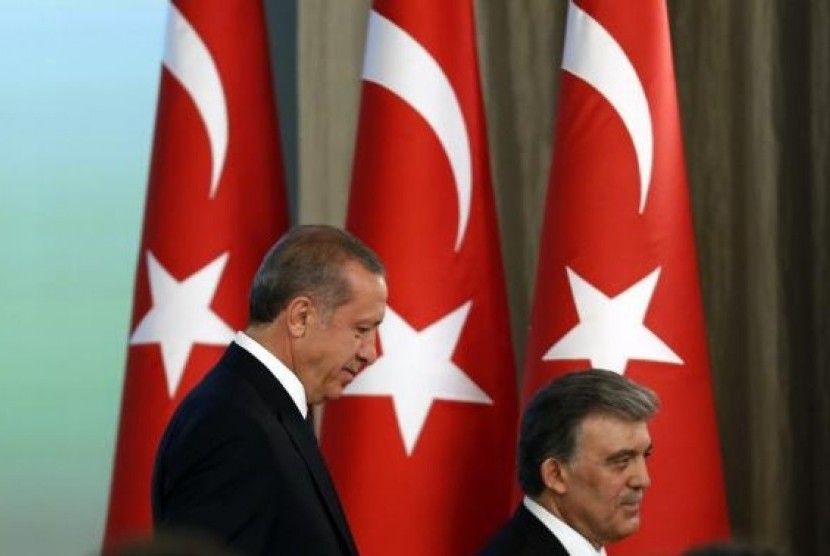REPUBLIKA.CO.ID, By: Muhammad Pizaro *)
Turkish aid shipments finally arrived in the Gaza Strip via Israel, a week after Israel and Turkey announced to end a six-year rift and restore ties. The aids are one of normalization agreements ending the six-year rift between Israel and Turkey. Turkish Foreign Minister, Jawish Oglu said, the aids as the first step to liberate the Gaza blockade. Will it become a reality?
Israel's Position
The Turkey-Israel normalization is a new era describing political relation in the Middle East. From the beginning, many analysts and Israeli medias had explained the weaker of Israel's fervency in the middle east.
Israel's effort closed to Turkey can be seen as stabilizing the rank in geopolitical and economy in the middle east. In Rome, Netanyahu described the agreement as having "strategic importance for the state of Israel, for security, for regional stability and for the Israeli economy."
Aluf Benn, Editor in Chief of Hareetz.com, had analyzed the impact of Israel's loss of its alliances with Turkey in the middle east geopolitics. It was compounded by apprehension about a deteriorating security situation in the south. Because of it, Israel had moved closer to Asad, Syrian President.
For the past three years, Netanyahu was Assad's silent ally. With the Syrian regime becoming destabilized, its borders breached and the struggle for its future rupturing the region, Israel had the back of the tyrant from Damascus.
Israeli's stand cooperating with Russia and Syria in military and defense showed the weakness of Israel power and viewed as an attempt to maintain its existence.
Regarding the normalization, the question is, will the Turkey-Israel normalization end Gaza's siege?
Turkey's demands are so demanding to do Israel, in particular, the requirement to lift Israel's blockade of Gaza is grueling. It can be seen from Netanyahu's state who repelled the Turkish ships to get directly to Gaza, but must go through Port of Ashdod. Netanyahu stressed Tel Aviv will remain on the blockade of maritime defense.
Reportedly, Israel did not initially want to discuss the blockade, refusing concessions of any kind. The two extreme positions had to be negotiated in order to find a middle ground.
Mohammed Kaya, the head of the Turkish Humanitarian Relief Foundation in Gaza (IHH), has a different perspective regarding normalization. He said IHH denies Israel’s apology and compensation for the incident. IHH stays stand to lift the blockade on the Gaza Strip completely.
Kaya emphasized that the economic and humanitarian projects that Turkey will be providing to Gaza will not succeed in lifting the siege nor can it do much to alleviate it, as the situation in Gaza can only be improved once the siege is completely lifted.
He warned that Turkey’s agreement to pass on humanitarian aid to the Palestinians in Gaza through Israel's Ashdod port and Karam Abu Salem crossing in southern Gaza is an official recognition of the blockade.
Moreover, Israel firmly urges Erdogan to limit the role of Hamas in Turkey, while the relationship between Hamas and Turkey are in peak. Even in a speech to the United Nations general assembly, Netanyahu equated Hamas and ISIS. An accusation indicating Israel's stand will never receive Hamas.
The Future of Agreement
The normalization will be a real challenge for Turkey political either in supporting of the Palestinian struggle as well as the diplomatic battle against Israel which has the long experience in an effort to manage its political power in Palestine. It will face with Erdogan who has strong in geopolitics in the Middle East by supporting a number of Arabic states and Palestinians.
For Israel, the question is, how does consistency of Israel holding the deal. As we know, Israel and Turkey have a long history of arduous diplomatic endeavors behind them, above all the Israeli file.
Besides, Israel's operation in Gaza might ruin any improvement in relations about the deal. That's why, Karel Valansi, a Turkish Middle East expert who writes for the Jewish-Turkish medias, said any agreement between the two countries would be like walking on eggshells, with the chance of falling apart at any moment. It will be warning for Turkey.
With all the political consequences, it is possible Jerusalem Post's prediction becomes true describing the Israel-Turkey normalization such as: to stop fighting publicly, while quietly continuing to disagree on virtually everything.
*) The Writer is an international politics observer from Institute of Zionist Studies. He graduated from the State Islamic University of Jakarta.


